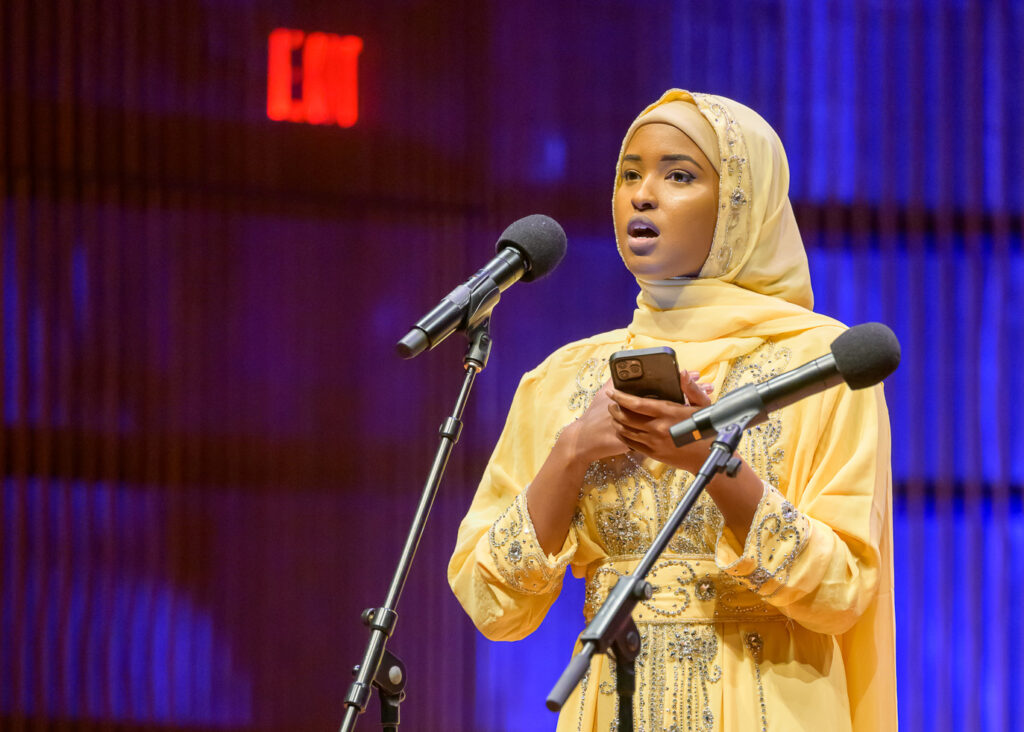First-Gen alum finds power through poetry
Muna Abdulahi’s storytelling represents the experiences of diverse people with nuance and authenticity.

By Jessy Rehmann
The first time Muna Abdulahi performed her own slam poetry on stage, it set her on a path to win multiple state poetry competitions, perform across the country and rank in the top 10 of an international tournament.
But as Abdulahi left her University of Minnesota freshman dorm room on that day in 2017 for the St. Paul poetry event, the prospect of performing an original piece filled her with a jumble of determination and nerves. Although she had mustered the courage to enter the pool of people who might be selected to perform, a part of her hoped the organizers would not call her name.
They did, of course. And in the video of Abdulahi’s performance that day, which has since garnered more than 40,000 views on YouTube, her nerves are nowhere in sight. Her left hand steadily grips her notebook, her eyes are strongly fixed on the audience, her words are clear and unwavering.
In the poem, which is based on her experiences being interviewed for news stories in high school, Abdulahi speaks out about being tokenized as a “leader.” As an academically accomplished Black, Muslim, Somali, female first-generation student, she felt academic institutions used her achievements to promote an unrealistic picture of diversity. They only focused on exceptional success stories instead of highlighting the everyday experiences of people of color.
As her voice rose and her pace quickened, Abdulahi closed the poem, “Not a Leader”, with the following excerpt:
I never realized I was a leader.
I am just like everybody else.
I just want to be out.
Out of the pain,
Out of the racism,
The sexism,
The anything-isms.
I just want to be out.
Out.
Out.
Out.
I,
I am just someone who realized at a very young age
The only hope to being out is being outspoken.
So please,
Do not interrupt me.
I am just getting started.
Inspiring diverse voices
As she reflects on that performance six years later, Abdullahi said she honors the early poet she once was. Even at the beginning of her career, she was focused on her poetry’s mission: to promote cross-cultural understanding by telling the stories of diverse identities that are commonly erased from literature.
“Growing up and not seeing myself in the stories that I was being given in academia, what that does in a way is other ourselves and each other,” she said. “And create this narrative that these stories are important and if I don’t see myself in these stories, then I’m not important. The reason why I make it a mission to share these stories is to showcase that these stories are just as important as any other story.”
Abdulahi said her poetry — which often touches on themes of prejudice, oppression and violence — is also meant to raise important conversations within the Somali community. She said there’s a stigma in her culture around discussing trauma. This avoidance of sensitive topics can result in a lack of accessible language to describe emotions and harmful experiences.
“A lot of the times, it’s me picking up the rug that had a lot of hard stuff swept under that people don’t want to talk about,” she said. “So in a way, what I’m doing is giving language to that, because through starting the narrative, we allow each other to learn and to grow within that.”
Abdulahi’s poetry also inspires young people in the Somali community to follow their passions, said her cousin, Amran Yusuf. A current second-year first-generation student at the university, Yusuf said there’s pressure within African immigrant cultures to obtain practical jobs. Abdulahi shows that creative pursuits can lead to widespread impact and personal success.
“I feel like Muna is really helping a lot of younger Somali people really tune into what makes them happy and what brings out the best for them,” Yusuf said. “Through her poetry, she’s saying, ‘If I can do it, you can do it.’”
Abdulahi was not always an outspoken, self-assured person, Yusuf said. When they were growing up, Abdulahi was introverted. It wasn’t until the poet came to the university that Yusuf saw her cousin evolve into the advocate she is today.
“It was like watching a flower or a plant or a butterfly — something grow,” Yusuf said. “Once she was exposed to new people, new environment, new communities, that’s when she really flourished.”
Finding belonging at school and stage
Abdulahi grew up in Willmar, Minnesota, where the population at her high school was predominantly white, and the majority of Somali students were immigrants, not first-generation Americans like her. Because she has refugee parents but was raised in the cultural context of the U.S., Abdulahi felt like she didn’t fit into a community in her small town of fewer than 20,000.
“It was this constant barrier in regards to finding voice, finding belonging, finding identity and feeling like you’re always in the in-between spaces,” she said.
The first time Abdulahi felt that her identities were truly understood was when she joined her high school speech team, which was where she discovered slam poetry and heard the voices of people who looked like her.
“Before then, I was mostly learning about white poets and their words and white authors and their words,” she said. “So when I joined speech, I would say that was the first time I really started to be able to feel represented and seen.”
Still, she yearned for a sense of belonging with her peers. She decided to go to the University of Minnesota because the large student body and urban setting would expose her to diverse populations that were absent in her hometown.
Abdulahi said her parents could not help her navigate college because they did not have experience in higher education in the U.S. Being a part of the President’s Emerging Scholars program during her first year helped her meet other first-generation, low-income students of color who could connect to her lived experience, she said.
From there, Abdulahi joined the Black Student Association, the African Student Association and the welcome event team at the Multicultural Center for Academic Excellence. She also became a member of the Somali Student Association, which she said was a particularly powerful experience.
“That was the first time I’d met other Somali students who were first-generation born in the U.S. and who are just like me and I was like, ‘Wow.’” she said. “It was really incredible in the sense that I was able to form community with people who looked like me.”
Abdulahi has a natural sense for recognizing how identity shapes a person’s reality, said Evonne Bilotta-Burke, a teaching specialist in the university’s leadership minor program. When Abdulahi was her student and later her teaching assistant, Bilotta-Burke said the poet was able to make her peers acknowledge their positions of privilege and consider diverse perspectives.
“Her ability to connect to people who navigate this world differently than her and tell them the truth about what they think is the one end-all-be-all reality of living — it’s just a wonderful thing and it’s a gift,” Bilotta-Burke said.
An ongoing journey
Since that initial spoken word performance as a freshman at the university, Abdulahi has traveled to regional, national and international poetry competitions. In 2018, she was named the 8th woman poet in the world at the Women of the World Poetry Slam Competition.
Her success in poetry is no surprise to Bilotta-Burke, who said Abdulahi has always been driven by passion rather than fame. When her former student performed at the inauguration of St. Paul’s first all-female City Council in January, she said it made complete sense.
“Muna’s name is in that grouping of all these amazing, incredible voices of slam poetry — the spoken word that is really reflecting back who we are as a people, especially in this state,” Bilotta-Burke said. “So in this really powerful moment of all female-presenting Council members, to have Muna’s voice as part of that sort of mix, all of that was like, ‘Yes, yes, yes.’”
Abdulahi is also writing her first poetry book, which she’s been working on since college. While there is no publish date yet, Abdulahi said she’s excited to be nearing the end of this passion project.
Abdulahi said she’s grateful to have poetry as a tool to tell the kinds of diverse stories she did not see in classrooms until college. By sharing stories that represent various dimensions of being a marginalized person in the U.S., she continues to connect with new faces that share her intersecting identities.
“To me, it claims such a power that I hold so dearly,” she said. “So to see other people find solace in that and to find themselves, that to me means absolutely everything. So all of it is just an honor.”
In her performance at the inauguration of St. Paul’s first all-female City Council, Abdulahi left listeners with this closing excerpt:
Because the truth is,
To be a woman in a space that was not built for you,
Is to know how to build space with your bare hands,
To demand the attention of any room they step into
And to speak a lioness roar.
It is to be a walking figure of change, of growth,
Of growth.
To know how to rise,
And rise again,
And rise again,
And rise again,
And again, and again, and again.
You see,
The only thing I have left to say
Is for future references,
Do not interrupt us.
Because we,
They,
Are just getting started.

